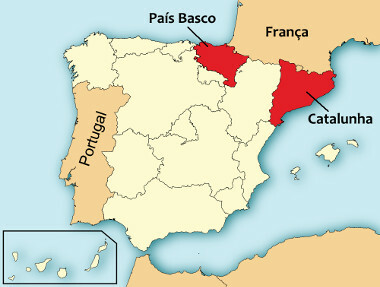Spain – as well as countless other countries – has a multinational State, that is, it includes in its territory countless nations or ethnic trunks that have a relative autonomous degree of organization and cohesion social. However, unlike many other locations, where the coexistence of this plurality is sustained relatively peacefully, in space Spanish geographical region there is a high political instability involving, especially, Catalans and Basques, in addition to some other ethnic groups (such as Galicians and Navarrese).

Location map of Catalonia and the Basque Country in Spain**
The question of the Catalans and the Basques, despite having older historical roots, became more evident during the dictatorship Francisco Franco, who for 38 years (1939-1977) harshly repressed any manifestation of independence on the part of these peoples. Next, we will learn a little more about the objectives and historical-geographical characterizations of these peoples who seek the constitution of their respective national States.
The question of Catalonia
The Catalans are located in the northeast region of Spain, constituting a relatively cohesive nation on Spanish territory, with its own language (Catalan) and its own cultural matrix. It is estimated that this nationality constituted its territoriality in Europe around the 12th century and had its autonomy permanently removed at the end of the War of Spanish Succession (1702-1714), which finally unified the Spanish territory under the domination of the Castilian language.
Despite the political dependence on the Spanish Government, the region of Catalonia was one of the most developed economically in the region, having been the first to industrialize in the country, throughout the century XVIII. Thus, having become the most economically stable location, Catalonia witnessed an intellectual movement in its domains, in the 19th century, called “Renaixença” (Renaissance), in which they sought to rescue the cultural identity and the original language of the Catalans. This movement was at the base of the quest for independence in Catalonia.
In 1932, a Catalan statute was approved with the creation of an autonomous government recognized by Madrid, capital and center of the Spanish Government, and a consequent proclamation of the Catalan Republic. However, this republic lasted a short time, as Francisco Franco's dictatorship ended with any autonomy of that nation, acting with strong repression and even prohibiting the use of the Catalan language in the country.
However, this long period of repression, which lasted for nearly four decades, only served to further fuel the feeling of independence on the part of the Catalans. After the end of the Franco dictatorship, a State was once again approved and the Catalan language was once again recognized, being even adopted as one of the official languages of Spain.
The granting of a certain Catalan autonomy, contrary to what Spain imagined, did not allay the feeling of separation on the part of the Catalans, who even today demand advances in this direction. Currently, recent surveys demonstrate the indecision of the population of Catalonia between the establishment or not of a fully independent nation-state. Despite this, the demonstrations and protests pro-independence are frequent in the region, triggering high local political instability.
Do not stop now... There's more after the advertising ;)
The question of the Basque Country
The Basque Country – which, in fact, is not a country – is currently configured as one of the autonomous regions of Spain, occupying an area of 20 thousand square kilometers, where more than 3 million population. The Basques have occupied the Iberian Peninsula for over 5,000 years, resisting several invasions (including the one from the Romans) and preserving their customs over time, even with the later domination exercised by the peoples barbarians. Currently, the language of that nation is the oldest among those currently used in Europe.
In addition to occupying part of Spanish territory, in its northern portion, the Basques also inhabit part of southern France, where the coexistence is more peaceful, due to the fact that only 10% of what would properly be the Basque country is located in French territory.
The Basques became part of the territory of Spain from the 15th century onwards, and their division with France was resolved in the 17th century. Despite this, the Basques gained, over time, a relative autonomy, unlike, until then, the other ethnic groups located in Spanish territory.
However, just as happened in Catalonia, the Basque Country suffered the harsh repression of the dictatorship of Francisco Franco, which restricted the independence movements and prohibited the use of the Basque language. As with the Catalans, this period served to further surface the feeling of refusal of Hispanic domination, giving rise to, including the terrorist group ETA (Euskadi Ta Askatasuna: “Basque Homeland and Freedom”, in Basque), which carried out terrorist attacks from the decade onwards. of 1970.
With the end of the dictatorship, the Basque Country regained relative autonomy, with its own parliament and an independent tax system. ETA, until then supported by the population, used to act with violent demonstrations, carried out through the assassinations of military and political authorities. Despite being in favor of independence, the Basques have turned against these practices of the terrorist group that laid down its arms in 2011, but continues to exist.

Basque population in peaceful protest for the constitution of their territory
What can be concluded with the case of the Basques and the Catalans is that these separatist feelings towards Spain had two different matrixes: the the first have a very strong historical and political stamp, while the second follow a cultural agenda from the Renaissance movement of the century XIX. Differences aside, political scientists consider that the tendency is for them not to achieve their independence during the coming years, given the strong support that the Spanish State has from the European Union and the UN (Organization of Nations United).
________________________
* Image Source: natursports and Shutterstock
** Image Source: Mutshamel and Wikimedia Commons
*** Image Source: karteaga and Wikimedia Commons
By Rodolfo Alves Pena
Graduated in Geography

